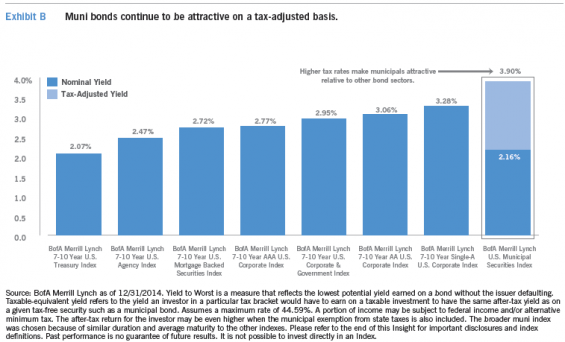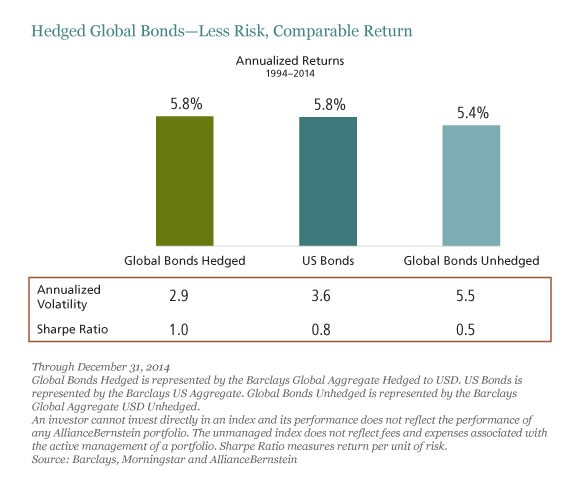Municipal Bond Terms That Investors Need to Know (AB)
Post on: 2 Май, 2015 No Comment

Municipal Bond Terms That Investors Need to Know (A-B)
January 07, 2014
By: Justin Kuepper
Municipal bonds are a great way for investors to preserve capital and generate tax-free income, since they are backed by the full faith and credit of governments or revenue-generating projects implemented by governments. Investors interested in municipal bonds should familiarize themselves with the basic terminology used in the market. In this article, we will define many of the most common terms and provide some examples of their everyday usage.
Accrued Interest
Accrued interest is the interest that has accumulated on a bond since its latest interest payment up to, but not including, the settlement date. When buying or selling municipal bonds, accrued interest is added to the price of the bond, since it hasn t been distributed yet to the owner.
For example, suppose that an investor holds a $100 municipal bond that pays 10% interest at the end of each year. If the investor decides to sell after the first six months, there would be about $5.00 of accrued interest and the bond would sell for approximately $105.
Ad Valorem Tax
Ad valorem tax is the amount of municipal property tax that s assessed by a public tax assessor and subsequently owed by the property owner. Since property taxes are a major source of revenue for municipal governments, ad valorem taxes can play a big role in the muni market.
For example, falling property prices in a municipality might precipitate lower ad valorem taxes as nearby property values are assessed lower. As a result, the municipality may receive less property tax income and its muni bonds may be riskier to hold or lose some value.
Advanced Refunded Funds
Advanced refunded funds are bond issuances used to pay off other outstanding bonds, where the new bond is often issued at a lower interest rate than the old bond. But importantly, the new bond is not tax exempt by the federal government (to prevent unlimited debt issuance).
For example, suppose that a municipality would like to lower its interest payments by issuing new lower rate bonds to pay off its older higher rate bonds. These new muni bonds may help reduce its current debt burden, but they would not be exempt from federal taxes.
Amortization of Debt
Amortization of debt is the accounting method that systematically reduces the cost value of a limited life, intangible asset, such as a municipal bond. For tax purposes, muni bondholders treat the bonds as an amortized asset over its lifespan, although not in actual buying and selling.
For example, suppose that an investor buys a muni bond at a premium, although that premium will eventually move to face value over time. As a result, the bond is amortized to reflect the premium or discount for tax and accounting purposes (but not necessarily market price).
Arbitrage
Arbitrage involves taking advantage of the difference between two or more markets by buying and selling two related assets at the same time. Often times, arbitrage opportunities are considered risk-free. since they should involve very little or no negative cash flow.
For example, many muni bondholders will purchase a portfolio of high-quality, tax-exempt muni bonds and simultaneously short sell a portfolio of equivalent taxable corporate bonds in order to profit from the tax rate in much the same way as an interest rate swap. Investors should note, however, that Federal income tax laws generally restrict the ability to earn arbitrage in connection with tax-exempt bonds or other federally tax-advantaged bonds.
Assessed Valuation
Assessed valuation is the value of a property for the purposes of taxation, particularly when it comes to municipal property taxes. These valuations take into account a number of different factors, including overall quality, market conditions, and nearby property values.
For example, suppose that many houses in a municipality have begun selling at a premium due to a new large employer setting up shop in the area. The assessed valuation of the properties in the area could result in greater property tax income for the municipality.
Average Life
Average life refers to the length of time that the principal of a bond is expected to be outstanding before it is repaid through amortization or sinking fund payments. The average life can be calculated by multiplying the date of each payment by the percentage of principal paid.
For example, suppose that a municipality has a $100 outstanding bond and pays $10 during the first year, $40 during the second year, and $50 during the third year. The average life of the bond would be 2.4 years or 240 divided by 100 by this calculation.
Balloon Maturity
Balloon maturity is a repayment schedule where a large number of bonds come due at the final maturity date. Problems can occur when municipalities issuing bonds haven t properly planned to make the final large payments that may be significantly higher than prior payments.

For example, suppose that a municipality issues three $100 bonds that pay interest only for the majority of their lifespan with a final $100 principal payment due at the end. The large balloon maturity of $300 owed at the maturity date could cause liquidity problems.
Bond Anticipation Note
Bond anticipation notes are short-term securities that are issued ahead of larger future bond issues. When the larger future bonds are issued, the proceeds are used to pay off these bond anticipation notes and ultimately finance the entire project.
For example, suppose that a city would like to build a new toll way, but must complete some feasibility studies beforehand. The municipality may choose to issue bond anticipation notes to finance these feasibility studies ahead of a larger issuance that would finance the toll way.
Bond Insurance
Bond insurance is a product offered by insurance companies that guarantees the scheduled payments of interest and principal on a bond in the event of a default by the issuer. In exchange for the bond insurance, investors or issuers pay lump sum or installment premium payment.
For example, suppose that a municipality would like to issue bonds, but its poor credit rating would mean a higher interest rate. By purchasing bond insurance for its offering, the municipality could enhance its credit rating to AAA and reduce its interest rate.
Bond Premium
Bond premiums occur when bonds trade above their par value, which happens when its coupon rate is higher than the prevailing interest rate. Bonds may also trade at a premium when they are in high demand, such as when a financial crisis forces a flight to safety.
For example, a bond offering a 5% coupon when prevailing interest rates are at 2% will trade at a premium to match its yield to maturity. As the bond approaches maturity, the premium will dissipate to zero, since it must be redeemed at par value at the maturity date.
Bonded Debt
Bonded debt represents the portion of a municipality s debt that is represented by bonds that it has issued or debt that it contracted under the obligation of a bond. Often times, these levels are used to assess a municipality s solvency to ability to issue additional debt.
For example, a municipality that has $100 million in outstanding bond principal and owed interest might have difficulty issuing additional debt if that amount is roughly equal to its total assets, since new bondholders wouldn t be secured by any assets.
Be sure to check out our other Definition Articles:














